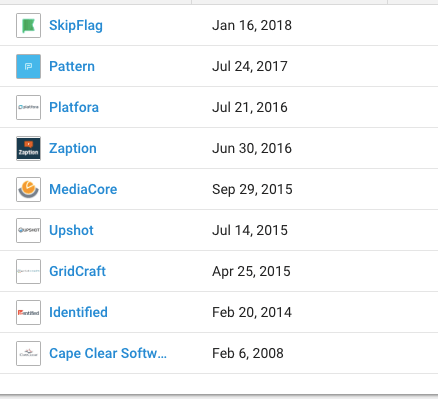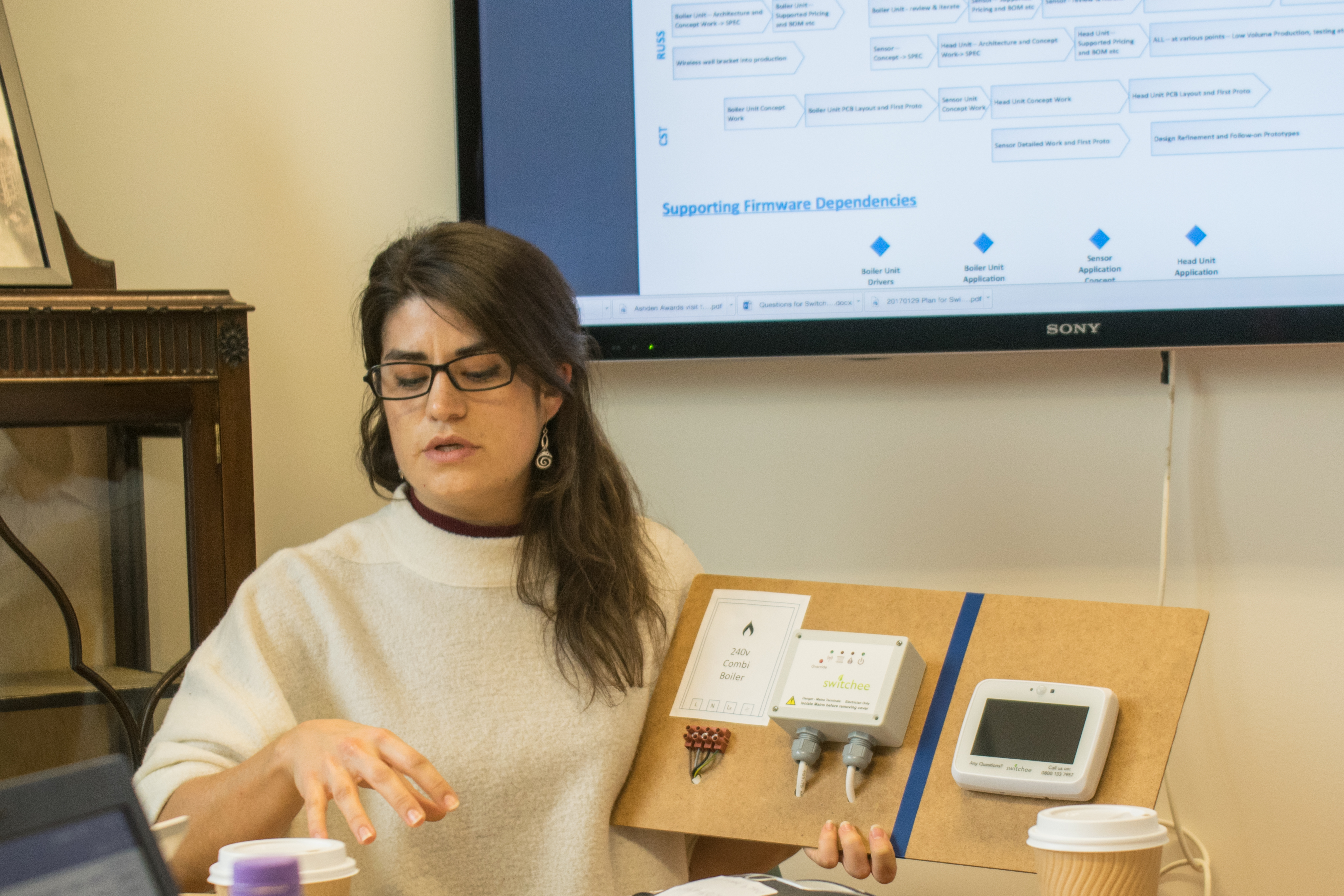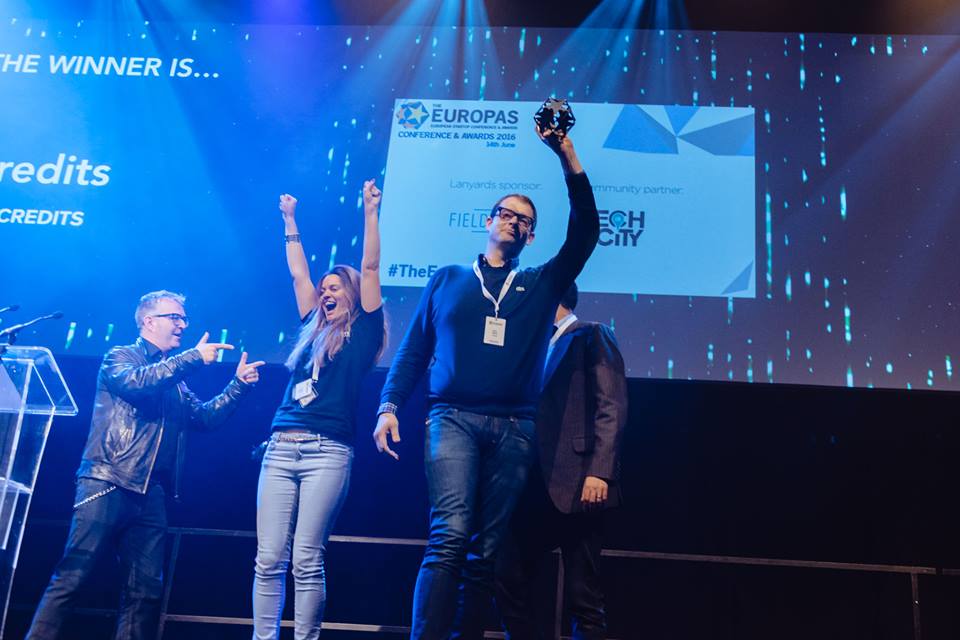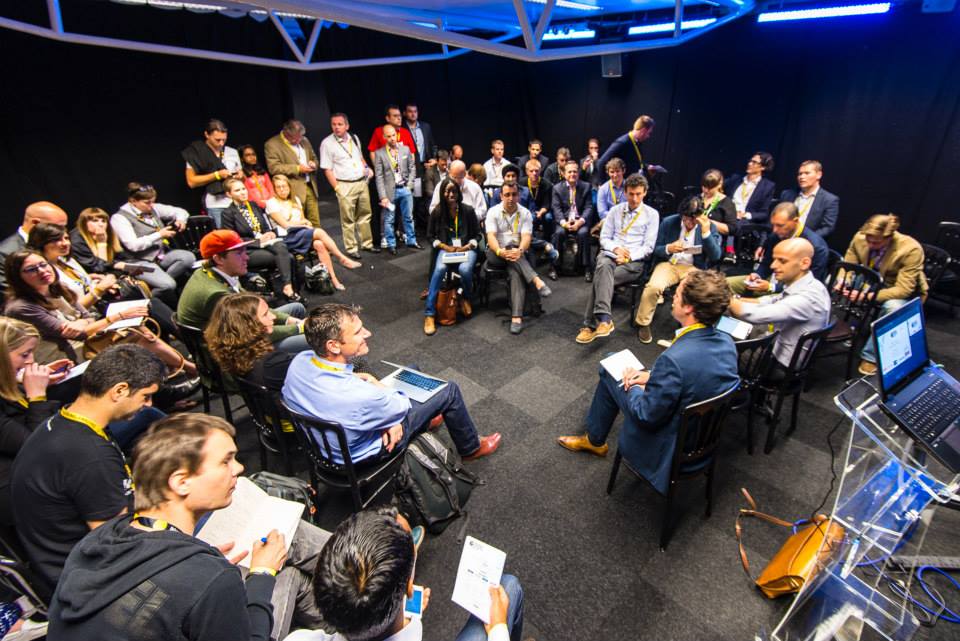Fundings & Exits
Auto Added by WPeMatico
Auto Added by WPeMatico
Amino has raised a big Series C round of funding — $45 million from GV, Venrock, Union Square Ventures, Goodwater Capital and Time Warner Investments, with Hearst Ventures joining as a new investor.
Co-founder and CEO Ben Anderson has described Amino as a way to help people who have “passionate niche interests” find others who feel the same way, via smartphone apps.
The company started out with apps focused on a handful of topics like K-pop, anime and Doctor Who, but it later added the ability for anyone to launch new communities in the main Amino app, and there are now more than 2.5 million communities.
Of course, some of these communities are more active than others, and there’s some overlap between them. But Max Sebela, who is general manager for Amino’s English-language apps, said there’s less overlap than you might think, because “each interest is actually a universe of micro interest.” For example, there might be one community focused on sharing strategy and tactics around the video game Overwatch, while another might revolve around sharing Overwatch fan art.
Ultimately, Sebela said it’s up to the founders and leaders of each community to decide what the community wants to focus on, and which product features they want to use to enable that. Meanwhile, Anderson said Amino is constantly tweaking its algorithms to make sure it’s surfacing the best communities for each user.
“Instead of one big, blue ocean, we provide a million lakes and help you find the exact right one,” he added.

Perhaps even more impressive than the number of communities is the amount of time the average user spends in Amino — more than 70 minutes per day.
One of the initial inspirations for the startup was a real-world anime convention, and Amino getting closer to that experience with the addition of features like live voice and video chat, as well as the screening room, where you can watch videos with other users.
During our conversation, Sebela opened up one of the K-Pop communities on his phone and was quickly able to listen in on a chat room where multiple users were singing along together. (Sadly, we didn’t join the singing.)
“The technology is not super unique,” Anderson acknowledged. “What makes it really special is, I can voice chat with my friends on a lot of different networks, but here I can hop in and join a voice chat with 10 Harry Potter fans who I may not know in my real life.”
While these features are already live, Anderson said they’ve been “downplayed” while Amino tests them out and works out the kinks. Now it’s ready to put them “front-and-center” in the app.
Amino has now raised more than $70 million in total funding.
It’s also been testing out ways to make money, which Anderson said will occur primarily through a subscription service — though apparently it’s too early for him to offer more details.
Powered by WPeMatico
San Jose-based Cohesity has closed an oversubscribed $250M Series D funding round led by SoftBank’s Vision Fund, bringing its total raised to date to $410M. The enterprise software company offers a hyperconverged data platform for storing and managing all the secondary data created outside of production apps.
In a press release today it notes this is only the second time SoftBank’s gigantic Vision Fund has invested in an enterprise software company. The fund, which is almost $100BN in size — without factoring in all the planned sequels, also led an investment in enterprise messaging company Slack back in September 2017 (also a $250M round).
“Cohesity pioneered hyperconverged secondary storage as a first stepping stone on the path to a much larger transformation of enterprise infrastructure spanning public and private clouds. We believe that Cohesity’s web-scale Google-like approach, cloud-native architecture, and incredible simplicity is changing the business of IT in a fundamental way,” said Deep Nishar, senior managing partner at SoftBank Investment Advisers, in a supporting statement.
Also participating in the financing are Cohesity’s existing strategic investors Cisco Investments, Hewlett Packard Enterprise (HPE), and Morgan Stanley Expansion Capital, along with early investor Sequoia Capital and others.
The company says the investment will be put towards “large-scale global expansion” by selling more enterprises on the claimed cost and operational savings from consolidating multiple separate point solutions onto its hyperconverged platform. On the customer acquisition front it flags up support from its strategic investors, Cisco and HPE, to help it reach more enterprises.
Cohesity says it’s onboarded more than 200 new enterprise customers in the last two quarters — including Air Bud Entertainment, AutoNation, BC Oil and Gas Commission, Bungie, Harris Teeter, Hyatt, Kelly Services, LendingClub, Piedmont Healthcare, Schneider Electric, the San Francisco Giants, TCF Bank, the U.S. Department of Energy, the U.S. Air Force, and WestLotto — and says annual revenues grew 600% between 2016 and 2017.
In another supporting statement, CEO and founder Mohit Aron, added: “My vision has always been to provide enterprises with cloud-like simplicity for their many fragmented applications and data — backup, test and development, analytics, and more.
“Cohesity has built significant momentum and market share during the last 12 months and we are just getting started.”
Powered by WPeMatico
A month after it filed for a much-anticipated Hong Kong IPO, Xiaomi has revealed a little more financial information after a monster 621-page document disclosed a $1.1 billion (seven billion RMB) loss for the first quarter of the year.
The IPO, which could raise up to $10 billion value Xiaomi at high as $100 billion, is set to be the largest IPO raise since Alibaba went public in the U.S. in 2014. That prospect got a boost with a dose of positive financial growth despite a loss incurred by one-off payments.
The document filed was an application to issue a CDR as part of a dual-listing that would include Mainland China, showed that Xiaomi’s revenue for the quarter jumped to 34 billion RMB, or $5.3 billion. That’s compared to 114.6 billion RMB ($17.9 billion) in total sales for all of last year, according to digging from TechCrunch partner site Technode.
While Xiaomi posted a loss for the quarter, the firm actually posted a 1.038 billion RMB ($162 million) profit for the period when one-time items are excluded. Xiaomi previously registered a 43.9 billion RMB ($6.9 billion) loss in 2017 on account of issuing preferred shares to investors (54 billion RMB) but it did post a slim profit in 2016.
The company is ranked fourth based on global smartphone shipments, according to analyst firm IDC, and it is one of the few OEMs to buck slowing sales in China.
China is, as you’d expect, the primary revenue market but Xiaomi is increasingly less dependent on its homeland. For 2017 sales, China represented 72 percent, but it had been 94 percent and 87 percent, respectively, in 2015 and 2016. India is Xiaomi’s most successful overseas venture, having built the business to the number one smartphone firm based on market share, and Xiaomi is pledging to double down on other global areas.
Interestingly there’s no mention of expanding phone sales to the U.S., but Xiaomi has pledged to put 30 percent of its IPO towards growing its presence in Southeast Asia, Europe, Russia “other regions.” Currently, it said it sells products in 74 countries, that does include the U.S. where Xiaomi sells accessories and non-phone items.
Despite its design progress, relative age as an eight-year-old company and the fact it is shooting for a $100 billion, Xiaomi left some spectators disappointed when it wheeled out a very iPhone X-looking new device earlier this month. While the company claims the Mi 8 is packed with new technology, it’s hard to look past the fact that a number of its visual designs are identical to Apple’s flagship smartphone. Xiaomi could have made a stronger statement of intent with the launch, but it will hope its financials can do the talking as it moves into the last moments of preparation before its public listing.
Powered by WPeMatico
Sometimes you acquire a company for the assets and sometimes you do it for the talent. Today Workday announced it was buying Rallyteam, a San Francisco startup that helps companies keep talented employees by matching them with more challenging opportunities in-house.
The companies did not share the purchase price or the number of Rallyteam employees who would be joining Workday .
In this case, Workday appears to be acquiring the talent. It wants to take the Rallyteam team and incorporate it into the company’s engineering unit to beef up its machine learning efforts, while taking advantage of the expertise it has built up over the years connecting employees with interesting internal projects.
“With Rallyteam, we gain incredible team members who created a talent mobility platform that uses machine learning to help companies better understand and optimize their workforces by matching a worker’s interests, skills and connections with relevant jobs, projects, tasks and people,” Workday’s Cristina Goldt wrote in a blog post announcing the acquisition.
Rallyteam, which was founded in 2013, and launched at TechCrunch Disrupt San Francisco in September 2014, helps employees find interesting internal projects that might otherwise get outsourced. “I knew there were opportunities that existed [internally] because as a manager, I was constantly outsourcing projects even though I knew there had to be people in the company that could solve this problem,” Rallyteam’s Huan Ho told TechCrunch’s Frederic Lardinois at the launch. Rallyteam was a service designed to solve this issue.
Last fall the company raised $8.6 million led by Norwest Ventures with participation from Storm Ventures, Cornerstone OnDemand and Wilson Sonsini.
Workday provides a SaaS platform for human resources and finance, so the Rallyteam approach fits nicely within the scope of the Workday business. This is the 10th acquisition for Workday and the second this year.

Chart: Crunchbase
Workday raised over $230 million before going public in 2012.
Powered by WPeMatico
Switchee, an IoT startup based in London, has raised £1.3 million in “pre-Series A” funding for its smart thermostat and accompanying cloud-based service. However, unlike consumer offerings, such as Nest, Hive or Tado, the company’s product is targeting large landlords, initially within the social housing sector.
The idea is to help social landlords both tackle fuel poverty amongst their residents and as part of their social remit, and to provide a scalable technology solution for managing their properties. This includes something akin to an early warning system for common housing stock maintenance issues, such as mould, poor insulation, or a failing boiler.
Leading the round is Fair by Design Fund, a new £15 million fund managed by Ascension Ventures and backed by Big Society Capital and Joseph Rowntree Foundation. It specifically targets companies tackling the U.K.’s poverty premium.
Other backers of Switchee’s latest round include Contrarian Ventures, an early stage energy fund backed by Lietuvos Energija (the largest energy provider in the Baltics), and AU Capital Partners, a VC fund focused on the U.K.-India corridor and investing in technology companies in IOT, Smart Cities and fintech. Previously Mustard Seed, and ClearlySo invested.
“We solve two problems, one on the resident side the other on the landlord side,” Switchee co-founder Ian Napier tells TechCrunch. “For residents, fuel poverty and high energy costs, with 1 in 10 households in the U.K. having to make a choice between ‘heating’ or ‘eating’. For landlords, the poor or non-existent data about their housing stock and resultant maintenance and repair inefficiencies. To give an idea on cost, the average annual maintenance spend per property is £4,000. We have even seen examples of Housing Associations not knowing which houses they own”.

Interestingly, Switchee has decided to build its own hardware rather than, say, piecing together existing consumer smart home solutions or simply white labelling a competitor’s offering. This is something Napier says the startup has routinely debated internally but decided that to deliver a smart thermostat that truly fits the needs of social landlords, it was necessary to be fully vertically integrated, with bespoke hardware working in tandem with the Switchee cloud service and landlord analytics.
And that seems to be working out quite well so far. Following two years of commercial pilots, including successfully deploying Switchee on a national scale last winter, the company says it is now working with over 40 of the U.K.’s leading social landlords, including Flagship Group, The Guinness Partnership, and Peabody, in addition to a number of Local Authorities and Councils.
“We sell the hardware, which landlords give to their residents for free. We also sell access to our landlord SaaS dashboard which aggregates sensory data from Switchee thermostats and presents housing management and welfare alerts. These data insights allow landlords to better understand and manage their large housing portfolios, and the communities they house, more efficiently”.
The Switchee device itself has temperature, light, motion, humidity and air pressure sensors, which it uses to learn occupancy and a property’s “thermal profile” i.e. how quickly it heats and cools. Based on this data, it then optimizes heating settings remotely — meaning that the Switchee device can be used passively, which Napier says is crucial for a non-direct to consumer offering — and as a result claims to reduce resident energy bills by up to 15 percent. It connects via 2G phone networks (in addition to WiFi) so as not to have to rely on a resident’s own internet connection.
“We can be passive ‘fit and forget’,” says Napier. “Switchee will automatically calculate optimum heating settings and regulate heating to reduce wastage and cut bills. Residents who receive a free thermostat can be less engaged than a consumer who chooses to buy a Nest or Hive… so we can’t rely on engagement. But we hope residents will love our technology and use it. We just don’t need them to if they have other things going on”.
The data the device collects is also used to produce a landlord dashboard displaying a range of welfare and maintenance KPIs and alerts such as mould risk, poor insulation, fuel poverty risk and boiler performance. “This facilitates a shift from reactive to pre-emptive maintenance, saving money and delivering better outcomes,” he says.
On the topic of data privacy, Napier says the Switchee team believe in using “data for good”. In this instance, to combat fuel poverty and to help social landlords care for properties and communities more effectively. “The real key to data privacy, we believe, is transparency and communication: we explain to residents what information we are collecting and why. And we always obtain consent before installing,” he says.
Asked specifically about the occupancy data the device collects and how it can be used, Napier says the company is not interested in the occupancy profiles that drive residents’ energy bill savings, only the outcome, i.e. lower energy bills. “Similarly, we don’t share raw occupancy with landlords, but we do have a couple of features derived from that occupancy. We can suggest convenient times for engineer, repair or other house visits. And we can alert landlords if we think a property has been abandoned,” he adds.
Powered by WPeMatico
French startup Lendix has raised a new funding round of $37 million (€32 million). With this new influx of cash, the startup has one goal in mind. It wants to become the leading lending marketplace of Continental Europe.
Idinvest and Allianz are leading the round, with CIR SpA (De Benedetti’s holding firm) also participating. Existing investors Partech, CNP Assurances, Decaux Frères Investissements and Matmut are also participating once again.
As of today, people living in France, Spain and Italy can sign up to lend money to companies established in those three countries. But the startup is already working hard to expand to the Netherlands and Germany before the end of the year. Next year, Lendix plans to operate in 7 countries.
And it seems like it’s becoming easier to launch new markets. There are now quite a few users and institutional investors on the platform. Lendix doesn’t need to attract Dutch users to start lending to Dutch companies. French, Italian and Spanish users are already willing to put some money in Dutch companies. It’s a true European user base because everybody uses the same currency.
With today’s funding round, it’s going to be easier to launch in Germany. “When you want to open in Germany — and that is our current plan — it’s harder to recruit if you don’t have a German brand name behind you,” co-founder and CEO Olivier Goy told me.
That’s why Allianz is going to be more than just a financial backer. For instance, the insurance company is going to promote Lendix to its corporate clients so that they think about Lendix if they need to borrow some money.
It’s another proof that Lendix doesn’t want to be a French company that operates in other countries. The company also has opened an office in Madrid and another one in Milan with local teams.
Lendix is still a drop in the bucket compared to traditional bank loans. But the company wants to differentiate its product offering from regular banks as much as possible.
Right now, when a company requests a loan, the company’s algorithms are going to work on a basic credit scoring. After that, somebody calls the company to ask a few questions. The Lendix team can focus on more specific information.
“We also have developed a tool called Iris,” CTO Benjamin Netter told me. “It is going to become the biggest intelligence database for European companies.”
France is leading the way when it comes to open data. You can now access the registry of commerce, the identification number database and important incorporation events. But it’s a mess if you want to access this data. There are different file formats, and the same database uses different fields depending on the region of France.
Lendix has been parsing all this data to turn it into an actionable database. This way, Lendix can get a clear overview of companies that apply for a loan.
The company doesn’t plan to stop there. You could use Iris to detect some fraud patterns. For instance, a person could keep incorporating new companies and shutting them down quickly.
Eventually, you could reach out to companies before they need to apply for a loan. Netter mentioned a restaurant called Street Bangkok. They’ve opened three restaurants over the past six months. It’s clear that they might need some money at some point to invest in new restaurants. Lendix Iris could spot those patterns.
Lendix is still nowhere near as big as Funding Circle. But the company thinks there’s enough room for multiple players in this space. Both can grow at the same time by competing with traditional banks.
And it starts by being faster than a traditional bank. Companies get a rate within 48 hours. “Our goal is that you should be able to get a rate within half a day,” Goy said. Banks will have a hard time giving you an answer so quickly.
Disclosure: I share a personal connection with an executive at CNP Assurances.
Powered by WPeMatico
Box announced today that it has purchased Progressly, a Redwood City startup that focuses on workflow. All 12 Progressly employees will be joining Box immediately. They did not disclose the purchase price.
If you follow Box, you probably know the company announced a workflow tool in 2016 called Box Relay along with a partnership with IBM to sell it inside large enterprises. Jeetu Patel, chief product officer at Box says Relay is great for well defined processes inside a company like contract management or employee on-boarding, but Box wanted to expand on that initial vision to build additional types of workflows. The Progressly team will help them do that.
Patel said that the company has heard from customers, especially in larger, more complex organizations, that they need a similar level of innovation on the automation side that they’ve been getting on the content side from Box.
“One of the things that we’ve done is to continue investing in partnerships around workflow with third parties. We have actually gone out and built a product with Relay. But we wanted to continue to make sure that we have an enhancement to our internal automation engine within Box itself. And so we just made an acquisition of a company called Progressly,” Patel told TechCrunch.
That should allow Box to build workflows that not only run within Box, but ones that can integrate and intersect with external workflow engines like Pega and Nintex to build more complex automation in conjunction with the Box set of tools and services. This could involve both internal employees and external organizations and moving content through a much more sophisticated workflow than Box Relay provides.
“What we wanted to do is just make sure that we double down in the investment in workflow, given the level of appetite we’ve seen from the market for someone like Box providing a solution like this,” Patel explained.
By buying Progressly, they were able to acquihire a set of employees who have a focussed understanding of workflow and can help continue to build out that automation engine and incorporate it into the Box platform. Patel says how they could monetize all of this is still open to discussion. For now, the Progressly team is already in the fold and product announcements based on this acquisition could be coming out later this year.
Progressly was founded in 2014 and was headquarted right down the street from Box in Redwood City. The company has raised $6 million, according to data on Crunchbase.
Powered by WPeMatico
If you’ve ever been in a pointless meeting at work, odds are you’ve spent part of the time responding to messages or just putzing around on the Internet — but Klaxoon hopes to convert that into something a bit more productive with more interactive meetings.
The French startup today said it’s raised $50 million in a new financing round led by Idinvest Partners, with early round investors BPI, Sofiouest, Arkea and White Star Capital Fund also participating. The company offers a suite of tools designed to make those meetings more engaging and generally just cut down on useless meetings with a room of bored and generally unengaged people that might be better off working away at their desk or even taking other meetings. The company has raised about $55.6 million in total.
The whole point of Klaxoon is to make meetings more engaging, and there are a couple ways to do that. The obvious point is to translate what some classrooms are doing in the form of making the whole session more engaging with the use of connected devices. You might actually remember those annoying clickers in classrooms used to answer multiple choice questions throughout a session, but it is at least one way to engage people in a room — and offering a more robust way of doing that may be something that helps making the session as a whole more productive.

Klaxoon also offers other tools like an interactive whiteboard (remember Smartboards, also in classrooms?) as well as a closed networks for meeting participants that aims to be air-gapped from a broader network so those employees can conduct a meeting in private or if the room isn’t available. All this is wrapped together with a set of analytics to help employees — or managers — better conduct meetings and generally be more productive. All this is going to be more important going forward as workplaces become more distributed, and it may be tempting to just have a virtual meeting on one screen while either working on a different one — or just messing around on the Internet.
Of course, lame meetings are a known issue — especially within larger companies. So there are multiple interpretations of ways to try to fix that problem, including Worklytics — a company that came out of Y Combinator earlier this year — that are trying to make teams more efficient in general. The idea is that if you are able to reduce the time spent in meetings that aren’t really productive, that’ll increase the output of a team in general. The goal is not to monitor teams closely, but just find ways to encourage them to spend their time more wisely. Creating a better set of productivity tools inside those meetings is one approach, and one Klaxoon seems to hope plays out.
Powered by WPeMatico
The Europas Unconference & Awards is back on 3 July in London and we’re excited to announce more speakers and panel sessions as the event takes shape. Crypto and Blockchain will be a major theme this year, and we’re bringing together many of the key players. TechCrunch is once again the key media partner, and if you attend The Europas you’ll be first in the queue to get offers for TC events and Disrupt in Europe later in the year.
You can also potentially get your ticket for free just by sharing your own ticket link with friends and followers. See below for the details and instructions.
To recap, we’re jumping straight into our popular breakout sessions where you’ll get up close and personal with some of Europe’s leading investors, founders and thought leaders.
The Unconference is focused into zones including AI, Fintech, Mobility, Startups, Society, and Enterprise and Crypto / Blockchain.
Our Crypto HQ will feature two tracks of panels, one focused on investing and the other on how blockchain is disrupting everything from financial services, to gaming, to social impact to art.
We’ve lined up some of the leading blockchain VCs to talk about what trends and projects excite them most, including Outlier Ventures’ Jamie Burke, KR1’s George McDonaugh, blockchain angel Nancy Fenchay, Fabric Ventures’ Richard Muirhead and Michael Jackson of Mangrove Capital Partners.
Thinking of an ICO vs crowdfunding? Join Michael Jackson on how ICOs are disrupting venture capital and Ali Ganjavian, co-founder of Studio Banana, the creators of longtime Kickstarter darling OstrichPillow to understand the ins and outs of both.
We’ve also lined up a panel to discuss the process of an ICO – what do you need to consider, the highs, the lows, the timing and the importance of community. Linda Wang, founder and CEO of Lending Block, which recently raised $10 million in an April ICO, joins us.
We are thrilled to announce that Civil, the decentralised marketplace for sustainable journalism, will be joining to talk about the rise of fake news and Verisart’s Robert Norton will share his views on stamping out fraud in the art world with blockchain. Min Teo of ConsenSys will discuss blockchain and social impact and Jeremy Millar, head of Consensys UK, will speak on Smart Contracts.
Our Pathfounders Startup Zone is focused purely on startups. Our popular Meet the Press panel is back where some of tech’s finest reporters will tell you what makes a great tech story, and how to pitch (and NOT pitch them). For a start, TechCrunch’s Steve O’Hear and Quartz’s Joon Ian Wong are joining.
You’ll also hear from angels and investors including Seedcamp’s Carlos Eduardo Espinal; Eileen Burbidge of Passion Capital; Accel Partners’ Andrei Brasoveanu; Jeremy Yap; Candice Lo of Blossom Capital; Scott Sage of Crane Venture Partners; Tugce Ergul of Angel Labs; Stéphanie Hospital of OneRagtime; Connect Ventures’ Sitar Teli and Jason Ball of Qualcomm Ventures.
Sound great? You can grab your ticket here.
All you need to do is share your personal ticket link. Your friends get 15% off, and you get 15% off again when they buy.
The more your friends buy, the more your ticket cost goes down, all the way to free!
The Public Voting in the awards ends 11 June 2018 11:59: https://theeuropas.polldaddy.com/s/theeuropas2018
We’re still looking for sponsor partners to support these editorially curated panels.
Please get in touch with Petra@theeuropas.com for more details.
SPEAKERS SO FAR:
Jamie Burke, Outlier Ventures

Jeremy Millar, ConsenSys

Linda Wang, Lending Block

Robert Norton, Verisart
George McDonaugh, KR1

Eileen Burbidge, Passion Capital
Carlos Eduardo Espinal, Seedcamp

Sitar Teli, Connect Ventures

Michael Jackson, Mangrove Capital Partners

Min Teo, ConsenSys

Steve O’Hear, TechCrunch

Joon Ian Wong, Quartz

Richard Muirhead, Fabric Ventures

Nancy Fechnay, Blockchain Technologist + Angel
Candice Lo, Blossom Capital

Scott Sage, Crane Venture Partners

Andrei Brasoveanu, Accel

Tina Baker, Jag Shaw Baker
Jeremy Yap
Candice Lo, Blossom Capital
Tugce Ergul, Angel Labs

Stéphanie Hospital, OneRagtime
Jason Ball, Qualcomm Ventures
The Europas Awards
The Europas Awards are based on voting by expert judges and the industry itself. But key to the daytime is all the speakers and invited guests. There’s no “off-limits speaker room” at The Europas, so attendees can mingle easily with VIPs and speakers.
Public Voting is still humming along. Please remember to vote for your favourite startups!
Awards by category:
Hottest Media/Entertainment Startup
Hottest E-commerce/Retail Startup
Hottest Marketing/AdTech Startup
Hottest Enterprise, SaaS or B2B Startup
Hottest Platform Economy / Marketplace
Hottest Cyber Security Startup
Hottest Internet of Things Startup
Fastest Rising Startup Of The Year
Hottest GreenTech Startup of The Year
Best Angel/Seed Investor of the Year
Hottest VC Investor of the Year
Hottest Blockchain/Crypto Startup Founder(s)
Hottest Blockchain Protocol Project
Hottest Corporate Blockchain Project
Hottest Blockchain ICO (Europe)
Hottest Financial Crypto Project
Hottest Blockchain for Good Project
Hottest Blockchain Identity Project
Hall Of Fame Award – Awarded to a long-term player in Europe
The Europas Grand Prix Award (to be decided from winners)
The Awards celebrates the most forward thinking and innovative tech & blockchain startups across over some 30+ categories.
Startups can apply for an award or be nominated by anyone, including our judges. It is free to enter or be nominated.
Instead of thousands and thousands of people, think of a great summer event with 1,000 of the most interesting and useful people in the industry, including key investors and leading entrepreneurs.
• No secret VIP rooms, which means you get to interact with the Speakers
• Key Founders and investors speaking; featured attendees invited to just network
• Expert speeches, discussions, and Q&A directly from the main stage
• Intimate “breakout” sessions with key players on vertical topics
• The opportunity to meet almost everyone in those small groups, super-charging your networking
• Journalists from major tech titles, newspapers and business broadcasters
• A parallel Founders-only track geared towards fund-raising and hyper-networking
• A stunning awards dinner and party which honors both the hottest startups and the leading lights in the European startup scene
• All on one day to maximise your time in London. And it’s sunny (probably)!

That’s just the beginning. There’s more to come…


Powered by WPeMatico
French startup Riminder recently raised a $2.3 million funding round from various business angels, such as Xavier Niel, Jean-Baptiste Rudelle, Romain Niccoli, Franck Le Ouay, Dominique Vidal, Thibaud Elzière and Fred Potter. The company has been building a deep learning-powered tool to sort applications and resumes so you don’t have to. Riminder participated in TechCrunch’s Startup Battlefield.
Riminder won’t replace your HR department altogether, but it can help you save a ton of time when you’re a popular company. Let’s say you are looking for a mobile designer and you usually get hundreds or thousands of applications.
You can then integrate Riminder with your various channels to collect resumes from various sources. The startup then uses optical character recognition to turn PDFs, images, Word documents and more into text. Riminder then tries to understand all your job positions and turn raw text into useful data.
Finally, the service will rank the applications based on public data and internal data. The company has scraped the web to understand usual career paths.
Existing HR solutions can integrate with Riminder using an API. This way, you could potentially use the same HR platform, but with Riminder’s smart filtering features.
With this initial sorting, your HR team can more easily get straight to the point and interview the top candidates on the list.
While it’s hard to evaluate algorithm bias, Riminder thinks that leveraging artificial intelligence for recruitment can help surface unusual candidates. You could come from a different country and have a different profile, but maybe you have the perfect past experience for a particular job. Riminder isn’t going to overlook those applications.
With today’s funding round, the company is opening an office in San Francisco to get some clients in the U.S.
Powered by WPeMatico